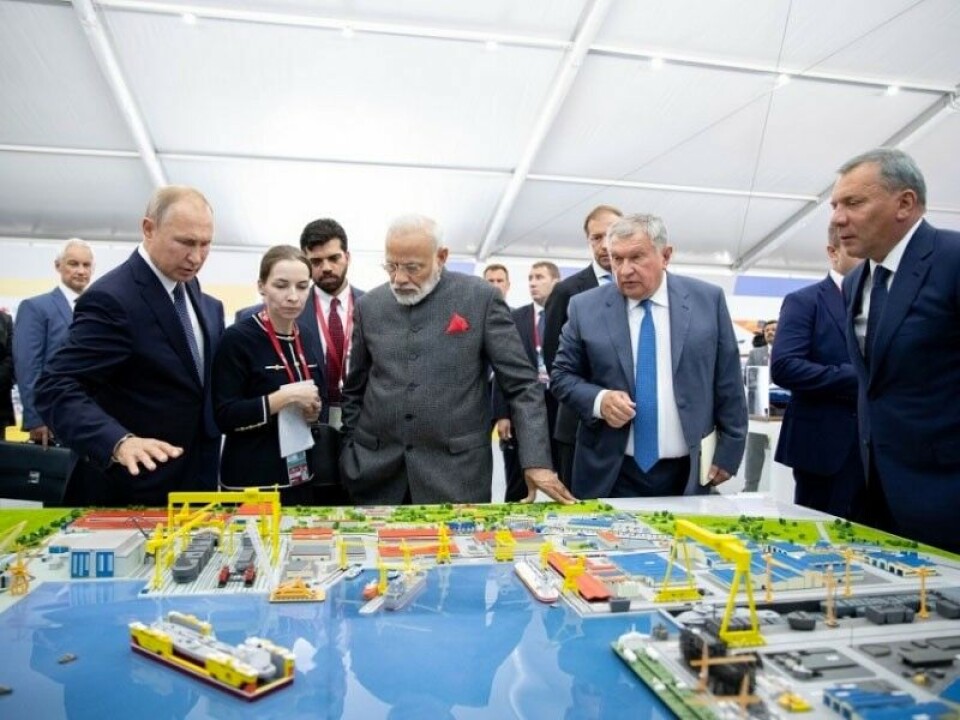
Igor Sechin looks to India for funding of grand Arctic oil project
Russian state oil company Rosneft invites Indian companies to invest in the far northern Vankor area and the construction of a pipeline to the Arctic coast.
p.p1 {margin: 0.0px 0.0px 0.0px 0.0px; line-height: 16.0px; font: 14.0px ‘Helvetica Neue’; color: #262626; background-color: #fff4ee}p.p2 {margin: 0.0px 0.0px 0.0px 0.0px; line-height: 16.0px; font: 14.0px ‘Helvetica Neue’; color: #262626; background-color: #fff4ee; min-height: 16.0px}p.p3 {margin: 0.0px 0.0px 20.0px 0.0px; text-align: justify; line-height: 23.8px; font: 14.0px Arial; color: #000000; background-color: #f0f0f0}p.p4 {margin: 0.0px 0.0px 0.0px 0.0px; line-height: 16.0px; font: 14.0px ‘Helvetica Neue’; color: #262626; background-color: #ffffff}p.p5 {margin: 0.0px 0.0px 0.0px 0.0px; line-height: 16.0px; font: 14.0px ‘Helvetica Neue’; color: #262626; background-color: #ffffff; min-height: 16.0px}span.s1 {font-kerning: none}span.s2 {font-kerning: none; background-color: #ffff54}span.s3 {font-kerning: none; background-color: #fff4ee}
The Indians are from before well represented in northern Siberia. Companies ONGC Videsh Ltd., Oil India Limited, Indian Oil Corporation и Bharat Petroresources own 49,9 percent of the joint venture Vankoneft and the latter three also control a major share of the Taas-Yuryakh Neftedobycha, a company that extracts oil in Yakutia.
Now, Rosneft and its leader Igor Sechin pushes for an expanded engagement of the Indians.
The energy cooperation was high on the agenda during the recent top meeting between Vladimir Putin and Indian Prime Minister Narendra Modi. Few days later, Rosneft leader Sechin paid a visit to New Delhi.
«Both parts confirmed their interest in a possible participation of Indian partners in the project Vostok Oil,» Rosneft informed following the talks.
In late October, Sechin welcomed an expanded Indian delegation in the far eastern city of Vladivostok. In the lead of that delegation was Indian Minister of oil, natural and steel Dharmendra Debendra Pradhan.
The talks took place at the Zvezda Yard, the major shipbuilding facility built by Rosneft. In the delegation were top leaders of several of India’s biggest industrial companies, among them ONGC and Tata Steel.
According to Rosneft, the Vostok Oil project was high on the agenda. The project includes the development of at least four oil fields in the Vankor area and the building of a 600 km long pipeline to the north coast of Arctic Ocean. The new pipeline and a projected terminal on the Taymyr Peninsula would enable the partners to export up to 25 million tons oil per year through the Northern Sea Route.
The pipeline can also carry oil from Payakha, the fields located along the Yenisey River, Rosneft says.
The Russian state oil company intends to build a fleet of top ice-class Arc7 tankers for the project. And they will all be built at the Zvezda Yard, the company insists.
Indian minister Dharmendra Pradhan spent as much as four days in the Russian east.
During the visit he stated that the Zvezda shipyard is «poised to make a huge contribution in the development of Arctic shipping and developing shipping routes between Russia and India.»
The project will help Russia reach its targets for shipping on the Northern Sea Route, Rosneft argues. Vladimir Putin has made Arctic shipping one of his top priorities and requests as much as 80 million tons of goods per year on the route by year 2025.
«Among the competitive advantages of the Vostok Oil is the vicinity of the Northern Sea Route, the unique transport corridor that opens for possible deliveries in two directions, to both European and Asian markets,» the company says.
«By year 2030, the oil production of the cluster could total up to 100 million tons, which would allow us to fulfill the May Decree of President Putin for deliveries on the Northern Sea Route.»
The Vostok Oil project will require massive investments and Rosneft has called for tax incentives of up to 2,6 trillion rubles from the Russian government.
The Ministry of the Far East and Arctic reportedly earlier this month supported the proposed tax cuts. However, the Ministry of Finances is likely to be more reluctant.
According to newspaper Vedomosti, the Russian government has now decided not to include the Vostok Oil in its list of prioritized projects.
















